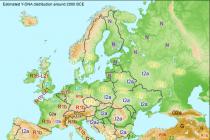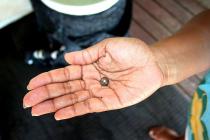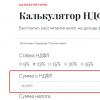The publication of the press secretary of the Belarusian Exarchate of the Russian Orthodox Church Sergei Lepin on our website provoked a strong reaction from social networks, as well as Belarusian and Russian media. Such behavior, which is so unusual for an Orthodox priest, causes stormy rejoicing and approval on the “faithful” resources and indignation on Orthodox and patriotic websites.
The image of Lepin is not exhausted by participation in the "Freedom Day" and anti-Russian nonsense in the opened correspondence. TELESCOPE journalists dug a little deeper and found new “touches to the portrait” that do not paint the latent autocephalist at all…
However, to begin with, let us repeat why Archpriest Lepin is “a bad person, radish”:
- He, being the official representative of the Belarusian Exarchate of the Russian Orthodox Church, came to the traditional political anti-Russian event, organized by anti-Russian political parties, and spoke from the stage, supporting the protesters in his speech. We remind Syarzhuk that, according to the Charter of the Russian Orthodox Church, “The canonical divisions of the Russian Orthodox Church do not conduct political activities»;
- In his speech, Lepin stated that the “BNR” allegedly “fought the invaders”, although it is well known that the armed formations, acting under the auspices of the “BNR”, fought exclusively against Russia(Soviet or non-Soviet - it doesn't matter) as part of the troops of foreign states who claimed to seize Belarusian lands;
- Lepin described the “BNR” figures as “enthusiasts” who cared for “Belarusian history and culture”, although their attitude towards the Orthodox Church, the pillar of our culture, to put it mildly, cannot be called complementary (the initiators of the proclamation of the “BNR”, the Lutskevich brothers, for example, rushed the idea of the revival of the union and closely communicated with Metropolitan Sheptytsky, and the acting head of the "Rada of the BNR" Lyosik spoke contemptuously about "parafial priests");
- Lepin ended his speech by uttering the traditional slogan for Belarusian anti-Russian nationalists “Long Live Belarus!” (for those who like to talk about the fact that this is “just a toast of our native Belarus”, we recall that “Glory to Ukraine!” Is just a call to love Ukraine, “Deutschland über alles!” Is just a manifestation of love for Fatherland, and the swastika is an ordinary solar symbol) ;
- Finally, Syarzhuk Lepin is not a good person, because he is also the two-faced Janus. Going to the Russian March for a priest means interfering in politics and "being in hell", going to the "Freedom Day" means "carrying the word of Christ." Shouting “Long live Belarus!”, praising the “BNR” with “Pagonyai” around their necks, putting themselves on a par with Western politicians, who also congratulated the audience on the “holiday” from the stage - well, serve a prayer service to the activists of the Russian NOD in the Minsk church - Badly.
Someone may say: “Well, my father was stupid, he didn’t figure out who he doesn’t happen to? Why run into him like that right away? However, not everything is so simple in our life. Syarzhuk is a long-standing Russophobe who, over time, has learned to disguise his personal position as the position of the Church.
In 2012, in his cozy LiveJournal, Lepin published a post under the heading “Chess. Belarusians are starting…”. Then, less than six years ago, the archpriest chatted like a broom, and was not yet so cunning. Then he became smarter and closed access to the recording, but did not take into account that the Internet remembers everything.
So, Lepin proposes ... to restore the Grand Duchy of Lithuania and unite Belarus and Lithuania into one state! And, in all seriousness (he doesn’t look like a madman in any way). The arguments are touching - "our peoples are connected somehow especially and economically as well." Integration with Russia is likened to the “Anschluss”, the very idea of unification processes is called “compromised” (I wonder what and by whom?), “imposed” (A.G. Lukashenko was the initiator of the unification processes, this is so, for Syarzhuk’s information). Belarus, according to Lepin, can integrate with Russia only under the pressure of force (the desire of the Belarusian leadership for further integration, the results of opinion polls, fixing the support of the Union State by the vast majority of Belarusians, are on the side).
For some reason, he mixes in jokes about the dismemberment of Russia and the separation of Smolensk, Bryansk and Kaliningrad from it, then writes that this, in principle, is not really a joke. To the accusation of individual commentators that Syarzhuk is still a Russophobe, he continues to “troll stupid maskals”: “Well, I also propose to unite - slowly and in stages” - they say, gee, let's integrate Russia into ON 2.0. in parts, but let's start with Smolensk and Bryansk. Jokes are jokes, and this is a violation of Article 280.1 of the Criminal Code of the Russian Federation "Public calls for the implementation of actions aimed at violating the territorial integrity of the Russian Federation."

Naturally, then this caused delight among the “faithful” inhabitants of the cozy Zhzhshechka.

Just think about it: an Orthodox priest of the Russian Church opposes rapprochement with Orthodox Russia, calls such rapprochement an “Anschluss” (i.e. compares Russia to the Third Reich), and suggests instead uniting with Catholic Lithuania, where Orthodox make up 4% of the population. A single church organization, the spiritual unity of Russians and Belarusians, Sergius of Radonezh, Seraphim of Sarov, John of Kronstadt, Xenia of Petersburg, Matrona of Moscow, the words of His Holiness Patriarch Kirill that “Belarus is not a bridge, not a gateway”, but “the most western part Holy Russia ”- Syarzhuk Lepin is not at all interested in this and, moreover, this is unacceptable for him. Because his real guise is the guise of a church separatist and Russophobe who made his way to the top of the Belarusian Exarchate of the Russian Orthodox Church.
Orthodox laity can personally ask Lepin why he has such a dislike for a country of the same faith and consanguinity to us, since the archpriest has
Sergei Lepin called the members of the "Immortal Regiment" fascists and threatened them with dismissal 15.05.2018 12:34
The parishioner of the Cathedral sent an appeal to His Holiness Patriarch Kirill of Moscow and All Russia, in which he touched upon important issues related to nationalist and autocephalous tendencies in the Belarusian Exarchate of the Russian Orthodox Church.
The author of the appeal paid considerable attention to the destructive activities of the chairman of the Synodal Information Department of the BOC, Archpriest Sergei Lepin, about whom TELESCOP has written more than once. With the permission of A.V. Babuk publish the text of the appeal in full.
Your Holiness!
Since 1991, in the Republic of Belarus, as in many other post-Soviet republics, there has been an increase in nationalist sentiments aimed at destroying the unity of Holy Russia. I myself come from the city of Grodno, the Western part of Belarus, and for about 10 years I was a parishioner of the St. Boriso-Gleb (Kolozhskaya) Church in Grodno. Historically, the Grodno region belongs to Black Russia, and this is the place where strong-willed people are formed and educated, as their life takes place in the bosom of the clash of the Orthodox Russian and Polish Catholic worlds. That is why these quasi-nationalist “Litvinian” sentiments are acute in this region, especially within the church environment. These sentiments are all the more destructive because the trend imposed as “Belarusian nationalism” is anti-Belarusian, destroying what Belaya Rus has been creating for centuries, being precisely Orthodox Belaya Rus!
Recently, some key representatives of the clergy of the Belarusian Orthodox Church of the Moscow Patriarchate have been actively participating in these sentiments. This is felt primarily by the trends that are taking place in the Church in relation to language. Yes, of course, there is nothing wrong with the Belarusian language itself, but some of our clergy use it as an instrument of political game against the all-Russian spiritual unity, especially since the Belarusians took a key part in the formation of the Church Slavonic and all-Russian languages. If another 10 years of worship in the churches of Grodno were held in the Belarusian language once a month, and this by and large suited both those who support the Belarusian language and those who like Church Slavonic, today services are held in the Belarusian language every week, and the parishioners even complain to the clergy that the language is simply imposed artificially, since the people of us, the parishioners, are not asked about this.
Priests such as the rector of the church in honor of the Cathedral of All Belarusian Saints in Grodno, Archpriest Anatoly Nenartovich, as well as the rector of the Holy Intercession Cathedral in Grodno, Archpriest Georgy Roy, in my opinion, are carrying out forced Belarusianization in the church environment in Grodno, because voluntarily or they involuntarily force people to switch to the Belarusian language, ignoring Russian, which the Belarusians created no less than the Great Russians, for example, the rhetoric of the Russian language was created by the Belarusian Simeon Polotsky, and the great Belarusian first printer Francysk Skaryna played the most important role in the formation and codification of the Russian literary language. In our country, according to the Constitution of the Republic of Belarus, two languages are adopted as state languages - Russian and Belarusian, respectively, the population can choose the language they see fit.
Quasi-nationalist trends among the clergy are also felt in the city of Minsk, where the clergy occupy solid positions. For example, this is evidenced by the recent participation of the chairman of the Synodal Information Department of the BOC, Archpriest Sergiy Lepin, in the celebration of the so-called Freedom Day on March 25, 2018, which this year coincided with the 100th anniversary of the formation of the so-called BPR - the “Belarusian People's Republic” - the occupational anti-Belarusian project. During this event, Father Sergiy made a speech, the text of which he published in his LiveJournal. This speech caused a very mixed reaction in the media. Firstly, Father Sergius for some reason considers the Republic of Belarus to be the successor of the Grand Duchy of Lithuania. Father Sergiy also said that “the leaders of the Belarusian People’s Republic fought against the occupiers with their initiatives and demanded freedom for many thousands of Belarusians languishing in prisons.” I wonder what kind of freedom Father Sergius means? If freedom from German occupation during the First World War, then it must be said that the BNR was formed just at the time when Belarus was occupied by the Germans, to whose occupation the creators of the BNR gave Belarus. This quasi-state lasted only 9 months, but today for some reason this day is considered the day of independence of our country. What kind of independence can be under occupation? We have our own official holiday on July 3, which fits perfectly into the context of the liberation of Belarus from the Nazi invaders.

It so happened that I have been in close contact with Father Sergiy for many years. This is primarily due to the fact that we are united by belonging to the scientific environment. Father Sergiy is a doctor of theology and an associate professor at the Minsk Theological Academy. I, in turn, am a candidate of philological sciences, a senior lecturer at the Faculty of International Relations of the Belarusian State University. And Father Sergiy and I quite often meet at various scientific and social events among students. He even came to us with lectures at the university. This year, for the first time in Minsk, on Victory Day, May 9, I took part in the Immortal Regiment action. As far as I know, this action took place in all regional cities of the Republic of Belarus, as well as in all major cities of the Russian Federation. Numerous reports in the media, as well as messages on social networks testify to the large number of people who took to the streets to honor the memory of their relatives and friends, who accomplished a feat and gave their lives for the future generation, for the Fatherland.
However, Father Sergius, in a private conversation, not only called the members of the Immortal Regiment fascists, but also threatened them in correspondence with dismissals from their jobs. The ribbon of St. George, repeating the symbols of the military clergy of the Russian Church, he called "fascist symbols." It turns out that if a person participates in the Immortal Regiment campaign with a St. George ribbon on his chest, should he be called a fascist for this? This is defamation.
For centuries, the Orthodox Church as a spiritual organism has been and remains the defender of traditional values and statehood, as evidenced by the entire church history. However, today, when someone's mercantile interests interfere in the lives of ordinary people, some clergy also boldly interfere in the anti-Orthodox, anti-Belarusian, anti-Russian political game, going against the shrines and values of those whom they consider their flock. Moreover, occupying key positions, such as the chairman of the Synodal Information Department of the Exarchate, his anti-Orthodox and anti-Belarusian propaganda acquires the appearance of the position of the Church, which has disastrous consequences. In the Republic of Belarus, Father Sergiy is a rather public and well-known person. His LiveJournal is included in the list of the 25 most read resources of the Belarusian Internet. However, in my opinion, the fact that lately Father Sergius has been increasingly focusing on the propaganda of the anti-Belarusian anti-Orthodox policy, this creates a candidate for promoting autocephalous sentiments within the Belarusian Orthodox Church, as evidenced by the facts that I cited above in the letter. But this contradicts the position of the Hierarchy, which stands for the unity of the Russian Church and, accordingly, is against autocephaly and the no less anti-Orthodox, Uniate project of autonomy for the Belarusian Orthodox Church. In fact, about Sergiy Lepin began to play in the Belarusian Exarchate the role of the Vicar of the Kiev Metropolis Alexander (Drabinko), who “from the inside” actively helps the pro-Nazi Poroshenko regime to destroy the Church. Drabinko's political denunciations of fellow archpastors have already led to their appearance on the lists of the Nazi Peacemaker website, which is the first step towards extrajudicial physical reprisals against Metropolitan Anthony of Boryspil, Bishop Viktor and Fr. Nikolay Danilevich. Political denunciations and threats about. Sergiy Lepin to the Orthodox members of the "Immortal Regiment" - these are actions similar to Drabinko's provocations.
In this regard, I draw the attention of Your Holiness, as our First Hierarch, who at the meeting of the Supreme Church Council in 2017 gave his blessing to maximally intensify Orthodox participation in the Immortal Regiment, to actually church this popular patriotic movement, to the dangerous consequences of the statements and actions of Fr. Sergiy Lepin and on ongoing projects of anti-Orthodox forces to reject the Belarusian Exarchate from the Russian Orthodox Church.
Asking for your First Hierarchal blessing and holy prayers,
Your Holiness a humble novice.
Orthodox Christians celebrated the day of the Holy Trinity on June 4th. The Sputnik correspondent talked about the history and significance of the holiday with Archpriest Sergei Lepin, chairman of the Synodal Information Department of the Belarusian Orthodox Church.
– Trinity is the last holiday of Paschal time, after which the church calendar begins the daily count of Sundays: the first week after Pentecost, the second week… The Lord, before His Ascension to Heaven, ordered His disciples not to leave Jerusalem until they received the promised Holy Spirit. The Day of Pentecost is the fiftieth day after Passover: on this day the Jews celebrated the giving of the law of God to the Jewish people, which took place on the fiftieth day of their exit from Egyptian slavery. When the apostles gathered for a festive prayer, suddenly there was a noise - as if from a rushing wind - and a special sign appeared over the heads of the apostles, resembling flames. Thus the Holy Spirit visibly marked His descent upon the apostles, reminded the clergyman.
Father Sergius emphasized that Pentecost is also called the day of the Holy Trinity and even the birthday of the Church, because the sending of the Holy Spirit to the Church marked the fulfillment of all the prophecies about the Holy Spirit and the completion of the divinely revealed teaching about the Most Holy Trinity. On this day, the Church was given the fullness of the Truth, and she herself became "the pillar and ground of the Truth."
— The Lord came to earth in order to take upon Himself the fullness of human nature, to heal us from sin and its consequences, in order to teach us the commandments of eternal life, in order to offer a sacrifice on the cross for the remission of sins for each of us, so that to lift His humanity to Heaven, and at the same time prepare the way to God for every believer. The Lord after His Resurrection did not remain His body on earth with His disciples — He ascended to beg His Father to send us the Holy Spirit. Thanks to the fact that Christians receive the Holy Spirit, they have the opportunity to be in constant contact with the Lord, not being limited by either time or space, but only by their own subjectivity,- said the archpriest, noting that Christians are preparing for this day, imitating the apostles in everything.
“They are trying to be together, with the Church, overcoming the fears and dangers of the vanity of the world, following the command of the Lord not to leave the spiritual Jerusalem — the center of joy in the Resurrected and Ascended Savior and, of course, in prayer and expectation of the Holy Spirit. This is a celebration of life, a celebration of the triumphant truth of God and spiritual summer - to commemorate this, churches are decorated with greenery. We encourage everyone to attend this day of worship. It will be right if each of us, desiring renewal from the Holy Spirit, purifies his heart with repentance, and sanctifies his soul with the Communion of the Holy Mysteries, and shows his faith in deeds of mercy and love,- said the chairman of SINFO BPC.
"These events caused a storm of indignation on the part of a huge number of believers."
Patriarchal Exarch of All Belarus Pavel.
December 2014.
Can we question the words of the Primate of the Belarusian Orthodox Church? No. It really was a storm. And it really was our indignation. Only in this way could the Orthodox Christians of Belarus react to the attempt to split our Church.
Like a bolt from the blue, in 2014 the decision to petition for granting the Belarusian Orthodox Church the status of a self-governing church on the model of Latvia, Moldova and Estonia sounded.
What's this? And this is a split. That is how the Orthodox Christians of Belarus perceived this intention. The news is rapidly spreading among Belarusians. For believers, it is tantamount to a message about the beginning of the war.
Orthodox Christians decide to buy houses on Russian territory along the border. The possibility of acquiring empty Russian villages and building Orthodox churches there, which will no longer be threatened by self-government and autocephaly, is being discussed.
It also all started in Ukraine. Chaos and rivers of blood, seizure and destruction of Orthodox churches, mockery of believers - Ukrainian refugees tell about all this. Belarusians understand that all this can happen again in their country. What to do?
Belarusians remember how, at the Bishops' Council of the Russian Orthodox Church in March 1992, the Ukrainian hierarchs stated in their speeches that the independence granted to the UOC in 1990 had yielded only negative results in a year and a half. They also spoke about the sharply negative attitude of their flock to secession from the ROC.
Many bishops of the Ukrainian dioceses disavowed their signatures under the petition for autocephaly, explaining that they acted under duress, fearing harassment by Metropolitan Filaret and the Ukrainian authorities. But it was already too late to refuse their signatures and repent of their deeds. The split was gaining momentum.
What conclusions should we, Belarusians, draw? The Ukrainian events confirm that the first sign of the spiritual decay of society is a schism in the Church. One has only to take the first step in this direction, and it will be impossible to turn back. Society will begin to destroy itself. All this is now happening in Ukraine.
Archpriest Pavel Boyankov, cleric of the Church of St. Alexander Nevsky (Minsk), writes: “The Ukrainian crisis irrefutably testifies that not only economic prerequisites contributed to its development, but also the deepest religious split in society. A quarter of a century ago, there, next to the Ukrainian Orthodox Church of the Moscow Patriarchate, with the direct support of the state (!), there arose a schism of Filaret Denisenko, sects of autocephalous self-consecrates and Uniates. Outwardly, the leaders of these anti-spiritual organizations almost do not differ from the Orthodox, but they are significantly superior to them in ultranationalism. And all the previous years, these doubles and mummers did not sit idly by - they "sacrificed", including "baptizing". But we know perfectly well that the imaginary "sacraments" of schismatics, impostors and heretics are absolutely graceless. Consequently, during this time a significant number of people appeared who consider themselves baptized, but in fact they are not. That is why in the east of Ukraine the Orthodox faced a host of demon-possessed non-Christs. “By their fruits you will know them”(Mt. 7, 16) ”(Promised Russia. Archpriest Pavel Boyankov).
And now, when we see into what wilderness the Ukrainian people have gone, the question arises: who is trying to send Belarusians along the Ukrainian path?
Fortunately, in December 2014, the news came: Patriarchal Exarch of All Belarus Pavel decided to close the issue of granting the Belarusian Orthodox Church of the Moscow Patriarchate the status of self-government. "The topic is removed from the agenda",- said the Primate of the BOC.
The schism of the Orthodox Church was eliminated in the very bud. It would not be an exaggeration to say that for the majority of Belarusians it was joy with tears in their eyes. But the anxiety of the believers remained.
How could this happen here, in Belarus? - Orthodox Christians asked each other this question at that time. Who started all this? So, after all, there are people in our country who want to bring believers to the streets. There is no other way to explain it.
The same question sounds in the words of Exarch of All Belarus Pavel: “I got the impression that this idea was deliberately thrown here, and today it sounded like never before. I must absolutely officially say that all the hype and noise brought nothing but harm.
The head of the BOC expressed the hope that this issue would not be raised in the next twenty-five years. In doing so, he remarked: “Against the background of what is happening in Europe and the world, this idea sounds somehow biased.”
Yes, then, in December 2014, we, Orthodox Christians, did not begin to thoroughly understand who was the initiator of obtaining the status of a self-governing Church. Both some Belarusian officials and individual clergymen could declare that in a sovereign state the Orthodox Church should also be sovereign. It is possible that this was their joint decision, but, fortunately, this was stopped in time.
Unfortunately, in March 2018, three years after those disturbing events, Belarusians were again called to the square. The Belarusian opposition decided to celebrate the 100th anniversary of the formation of the BPR. But is this event a holiday for the Belarusian people? No. This is a holiday of betrayal - there is no other way to call it.
In 1918, on the Belarusian lands occupied by Kaiser Germany, new politicians are announced, who, instead of organizing armed resistance to the invaders, begin to cooperate with the occupation regime. On February 21, 1918, they meet the German occupiers with bread and salt in Minsk, at the railway station, and then they give a dinner in honor of their "liberators" at the Europe Hotel. And already on March 25, 2018, these people announce the creation of the "Belarusian People's Republic".
At all times, the desire of a person to receive some benefits in exchange for cooperation with enemies, and even more so with invaders, was considered a betrayal and was equated with Judas sin. There can be no future for a state whose citizens are capable of betrayal and find dozens of excuses for their behavior. There can be no future for the state if other citizens agree with the traitor and also find dozens of excuses for his behavior.
The Belarusian people did not look for excuses for the traitors. He could not do this, because he was with them on opposite sides of the barricades. The traitors understood this, and therefore immediately gave their consent to the construction of two concentration camps in Minsk.
Two weeks after the declaration of independence of the BPR, the concentration camps were fenced with barbed wire, and three thousand Belarusians were driven into each of them. After that, brothels were opened in many cities and young women and girls were driven there to amuse German soldiers and officers.
And whatever you do for your benefactors. And on April 25, 1918, a month after the declaration of independence of the BPR, its leaders send a telegram to the German Kaiser Wilhelm II, in which they express their gratitude "for the liberation of Belarus by German troops": "Only under the protection of the German Empire does the region see its fair share in the future."
But Belarusians are freedom-loving people. Even for six centuries of the Lithuanian-Polish yoke, the Lithuanian princes and Polish kings could not force the Belarusians to recognize the supremacy of the Pope of Rome. Even after the betrayal by their nobility, its Catholicization and Polonization, Belarusians remembered their Russian roots and did not recognize someone else's faith. Therefore, under the Germans, the Belarusians did not follow the lead of politicians who trade in the freedom and independence of the country.
As a result of the offensive of the Red Army, Germany began the withdrawal of its troops from the occupied territories and in December 1918 Minsk was liberated. Together with the Kaiser's troops, the BNR government was also expelled from Belarus. As a result, the BNR remained a mythical country created on paper and in the excited minds of collaborators.
Do the current oppositionists not understand this? Yes, they do not want to understand. The West is paying them for it. But never before has Judah's pieces of silver benefited anyone. The Belarusian people know this and do not follow the lead of politicians who are on a short leash with the West.
But on March 25, 2018, the Orthodox Christians of Belarus were in a state of shock when they heard and saw the welcoming speech of the chairman of the Synodal Information Department of the Belarusian Exarchate of the Russian Orthodox Church, Archpriest Sergiy Lepin, in front of the opposition with white-red-white flags. On his chest, where the clergy usually have a cross, hung "Pursuit". "Long Live Belarus!" - said the speaker.
To be continued.
Associate Professor of the Department of Apologetics of the Minsk Theological Academy.
Education, academic degrees and titles:
Minsk Theological Seminary, Bachelor of Theology – 1996
Faculty of Philosophy and Economics, specialty “Philosopher. Teacher of Philosophy and Socio-Political Disciplines, with honors – 1999
Minsk Theological Academy, Candidate of Theology – 2000
Postgraduate studies at the Grodno State University with a degree in Ontology and Theory of Knowledge - 2003.
Associate Professor of the Minsk Theological Academy - 2006
Christian Theological Academy in Warsaw, Master of Theology, 2013
Christian Theological Academy in Warsaw, Doctor of Theology, 2014
Pedagogical activity:
Since 1996 he has been a lecturer at the Minsk Theological Schools, the Modern Humanitarian University, the European Humanitarian University, the Institute of Theology of the Belarusian State University.
Bio pages :
In 1998 he was ordained a deacon by Metropolitan of Minsk and Slutsk Filaret (Vakhromeev), Patriarchal Exarch of All Belarus.
In 2000, he was ordained a priest by the Archbishop of Novogrudok and Lida and until 2011 carried out pastoral obedience in the parishes of the Novogrudok diocese, combining it with teaching at Minsk theological schools.
Since 2011 - rector of the Holy Transfiguration Church in the village of Rakov, Volozhin district, Minsk region (Molodechno diocese).
In 2011, he was appointed press secretary of the BOC and transferred to the clergy of the Minsk diocese, while maintaining his teaching obedience.
From 2011 to 2015, he was the editor-in-chief of the Minsk Diocesan Vedomosti magazine.
In 2014 (to date) he was appointed chairman of the Synodal Information Department of the BOC.
2016 - awarded the right to wear a cross with decorations.
Co-author and presenter of the TV show “Holy Things of Belarus” on “BT3”, as well as the heading “On the Eternal” in “Arguments and Facts in Belarus”, the missionary blog “Being Between” (15 years, more than 1500 publications), regular appearances on radio, television , in print and electronic media.
Reviewer of the BPC MP Publishing Council.
Repeatedly prepared examinations of draft laws of Belarus (Law of the Republic of Belarus "On transplantation of human organs and tissues, Law of the Republic of Belarus", "On assisted reproductive technologies"), various legal acts and decrees. Compiled, edited, conducted theological examination of official documents of the Belarusian Orthodox Church and speeches (including scientific ones) of church hierarchs.
Familiarize yourself with the publications of Archpriest Sergiy Lepin.
Latest publications:
- Lepin S.L., prot. IVF: is it possible or not? Feedback on the “Statement of the Church and Public Council on Biomedical Ethics of the Moscow Patriarchate of the Russian Orthodox Church “Christian Attitude to In Vitro Fertilization” / Lepin S.L., prot. // Christian reading. - 2015. - No. 1. - P. 107-122.
- Lepin Sergius, prot. Gospel Conversations: The Parable of the Unmerciful Debtor. - Gazette of the Minsk Metropolis, - No. 3-5 (116-118) / 2015 - P. 114-115.
- Lepin Sergius, prot. Find in yourself the will to peace. - Gazette of the Minsk Metropolis, No. 3 (121) / 2106. – P.23-26
- Lepin, C., prot. If "God is dead": the problem of spirituality in modern Europe. / Lepin, C. // Prospects for the revival and modernization of Russia - from N.A. Dobrolyubov to the present day: a collection of reports of the International Scientific Conference "XXXVI Dobrolyubov Readings" / Ed. Dmitrievskaya G.A., Strogetsky V.M. - Nizhny Novgorod: Gladkova O.V., 201. - S. 91-95.
Main conferences:
- Lepin S., prot. "Spirituality as a categorical problem". “Modern civilization in dynamics from global instability to sustainable development.” – VII scientific and theoretical seminar of students, graduate students and young scientists, – Minsk, 05/22/2013
- Lepin S., prot. “The Role of the Church in the Formation of European Science,” Christian Culture and Education. Heritage, modernity, future. - X Holy Intercession Educational Readings. – Gomel, 23.10.2013
- Lepin S., prot. The interaction of the Church and society in relation to the problem of the death penalty. – International Conference “Immortal Penalty: Origins of a Responsible Position”, November 13-14, 2014, Minsk.
- Lepin S., prot. Saint Prince Vladimir and the Baptism of Russia: the civilizational choice of the East Slavic world – International scientific conference "The Holy Prince Vladimir and the Baptism of Russia: the civilizational choice of the East Slavic world", Zhirovichi, May 14-15, 2015
- Lepin S., prot. "Interaction between the Church and society in relation to the problem of the death penalty" - International Conference "Non-Death Penalty: The Origins of a Responsible Position", Minsk, November 13-14, 2014,
- Lepin S., prot. “Promoting the integration of persons released from places of deprivation of liberty in Belarus” – meeting of the expert group within the framework of the ICC project, Minsk, 07.12.14
- Lepin S., prot. The attitude of the Russian Orthodox Church to the death penalty: the background of the issue - Round table "The death penalty in the Republic of Belarus: problems of theory and reality" - PEI "BIP-Institute of Law", Minsk, 11.12.14
- Lepin S., prot. "Peaceful coexistence as a value and ministry of a journalist". Round table "Interethnic and interfaith relations in the Republic of Belarus at the present stage", Minsk, Institute of Journalism of Belarusian State University, May 20, 2015
- Lepin S. prot. "The Problem of Positive Motivation in the Prolife Movement". – Conference in memory of Tatyana Tarasevich “Prospects for the Belarusian movement in defense of life”. — Minsk, MOIRO, June 6, 2015
- Lepin S., prot. "Categories of spiritual and mental in relation to the problem of human mental health". — Report at the seminar “Mental disorders and violence: cause or effect?”, Molodechno. "Religious understanding of the nature of mental disorders and violence in line with the Orthodox Church", 04.2016
- Lepin S., prot. "Sexual Dimorphism in the Bible and the Tradition of the Holy Fathers" - International Scientific and Practical Conference "The Role of Women in the Development of Modern Science and Education", Minsk, May 17-18, 2016
- Lepin S., prot. "Spirituality as social capital" - international scientific conference "Church science at the beginning of the third millennium: current problems and development prospects". – MinDA.- Minsk 03.11.16
- Lepin S., prot. "Secular and Spiritual Education: Some Aspects from the History of Relationships" - Second Diocesan Christmas Readings. – Molodechno, 01.12.2016
- Lepin S., prot. "The problem of spiritual and moral education of students and prevention of the activities of pseudo-religious structures and destructive organizations." Report "Sectarianism as a Threat to Youth". – Vileika interdepartmental seminar for social educators and educational psychologists. Vileyka, 03.12.2016














